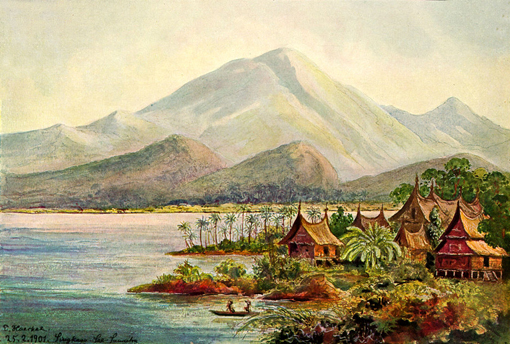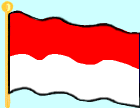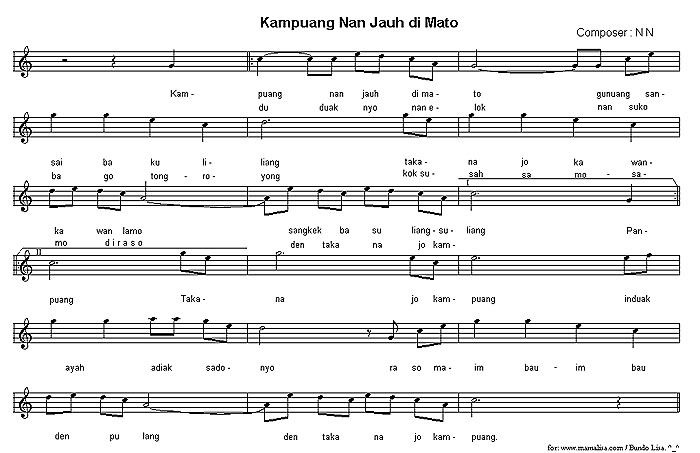Kampuang nan jauh dimato

Kampuang nan jauh dimato
Homeland So Far Away
Traditional Song
Traditional Song
(Minangkabau)
(English)
Kampuang nan jauh dimato
Gunuang sansai bakuliliang
Takana Jo kawan-kawan nan lamo
Sangkek basuliang-suliang
Panduduknyo nan elok
Nan suko bagotong-royong
Kok susah samo-samo diraso
Den takana Jo kampuang
Takana jo kampuang
Induk ayah adiak sadonyo
Raso mangimbau den pulang
Den takana Jo kampuang
Homeland so faraway
Surrounded by mountain ranges
Remembering old friends
When we blow the bamboo flute* together.
The loving people
Together helping others
Together in sorrow
Remembering my homeland.
Remembering my homeland
Mother, father, sister and all
Feel like calling me home,
Remembering my homeland.
Notes
*A suling is an Indonesian flute made out of bamboo.
Here's the translation in Bahasa Indonesia:
Kampung jauh dimata
Gunung berbaris dikelilingnya
Terkenang kawan-kawan lama
Ketika bersuling bersama
Penduduknya yang cakap
Suka bergotong-royong
Susah sama dirasa
Kuterkenang kampung halaman
Kuterkenang kampung halaman
Bunda ayah adik semuanya
Terasa memanggilku pulang
Kuterkenang kampung halaman.
Comments
Lin wrote, "Indonesia has several hundred local languages (from about 300 ethnic groups), and Bahasa Indonesia is the official national language.
The song is from West Sumatra, which has its own specific local language… In Indonesia we always sing the songs in their original languages.
The first version (Kampuang Nan Jauh Di Mato) is the original verse in the West Sumatran language. The second one (kampung jauh di mata) is its translation in Bahasa Indonesia (the national/official language), not the Indonesian version, since we never sing the song other than their original language.
The language of the song is called 'Bahasa Minangkabau' or 'West Sumatran Language' or 'Minangkabau language', all three have the same meaning. 'Minang' stands for Minangkabau. Minang is used as a popular unofficial term. Minangkabau is an ethnic name, such as the Minangkabau people. West Sumatra is the Province (or maybe State in the US).
People outside West Sumatra usually use a different term for the language such as 'Bahasa Padang' or 'Padang Language'. It's very common, but it's wrong. Because Padang is just a city, the capital city of West Sumatra Province. I have to tell you this, just in case you talk about this issue with other friends whom ever visited or live in Indonesia before."
Lin also wrote, "The West Sumatran people are known as good traders and travelers since a long time ago. So many of them made a living and raised their family in other regions. All over Indonesia you can find people who are originally West Sumatran.
This traditional song shows how they missed their home village in West Sumatra so much...
I think this song can also shows us how we connected to those who suffered from the 7.9 magnitude earthquake (on September 30, 2009) in West Sumatra, Jambi and other surrounding damaged areas. It breaks my heart to see how such a beautiful areas could be in such devastation, especially for the people who lived there... My heart goes out to them."


Thanks!
Thanks and Acknowledgements
Many thanks to Lin Fadelan for contributing and translating this song, for the photos and for such interesting commentary. Thanks to Harri Saptadi for the score and to Monique Palomares for the midi.
Image: Singkara-See, Padanger Hochland, Sumatra by Ernst Haeckels
Terima kasih banyak!


























